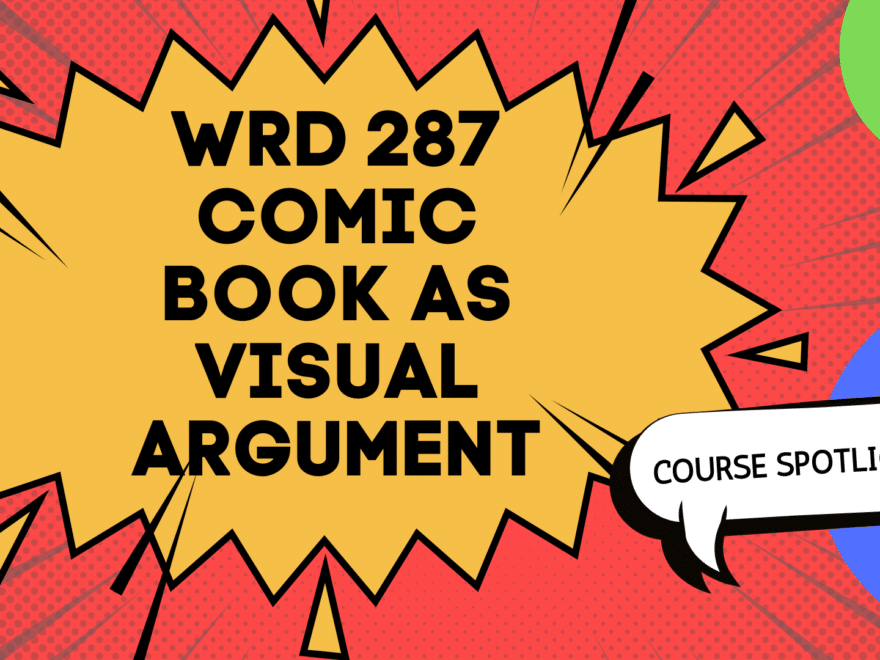There has long been an argument about whether or not graphic novels or comic books should be considered literature. Regardless of which side of the argument you may be on, it is a fascinating conversation to be sure. Professor Alan Ackmann is taking on an adjacent discourse in the upcoming course WRD 287 – The Comic Book as Visual Argument. This class will dig into the rhetorical nature of comics and explore the ways in which they add to conversations. Read on to learn more about this class and, perhaps, even get some reading recommendations if you cannot take this class.
Can you tell us a little about the course?
The course starts with two assumptions. The first is that every comic book is a direct product of a specific audience, purpose, and context. It reflects its authorship, but also its larger cultural and genre level trends. In other words, every comic is rhetorical and can be understood as such.
The second assumption is that every comic makes a range of arguments. Sometimes these are implicit, like how a mass market X-Men comic deals with themes of discrimination for example. Other times, the arguments are explicit, like comics that overtly try to persuade readers to take an action or form an opinion (political, propaganda, or science comics for example).
We also look at genre-level traits unique to comics. This includes art styles, panel transitions and divisions, use of time, and the interplay between words and images.
What inspired you to teach it?
Honestly, I inherited the class from another instructor who first proposed it, but it had been dormant for several years. After being approached about the course, though, I became fascinated with the idea of looking at a comic book as a sophisticated cultural product. That’s especially true since comics are often seen as low-brow and disposable, even when they’re beloved.
On a more general level, I love teaching classes that deepen understanding and appreciation of something many students natively love anyway.
What kinds of papers will your students be crafting?
We do a few short papers where we look at how specific comics operate in a larger context. The centerpiece of the course is an independent research project, where students get to pick their own comic book, research its context, and interpret any of its implicit or explicit arguments.
Do you see comics/graphic novels gaining more popularity? (I was the weird kid who read them often in school)
That’s a complicated question. Thanks to the Marvel and DC cinematic universes, comic figures are becoming much better known. Fringe characters, like the Guardians of the Galaxy, for example, are now mainstream. This has also popularized some of the more literary, character-driven comic runs and graphic novels of the 80s, which aren’t usually dismissed anymore, even if they aren’t necessarily embraced.
In terms of raw popularity, though, the comic book industry is publishing only a fraction of the titles and volumes it was churning out back in the ’40s (the Golden Age) or the 60s (the Silver Age).
Even if the numbers are down, though, there’s a wealth of independent publishing opportunities for comics now, and digital distribution methods mean artists can take bolder risks and reach wider audiences than was ever possible before, so there’s a renaissance of former work alongside tons of innovation.
So, yeah: complicated question.
Are there any comics/graphic novels you’d recommend folks read if they can’t take your class?
Maus by Art Spiegelman is worthwhile not only as a comic in its own right but also for being one of the first works that pioneered the graphic novel form. For the Marvel fans, my personal favorite run is The Visions written by Tom King and illustrated by Gabriel Hernandez Walta. Berlin by Jason Lutes is moody and atmospheric, like 1940s cinema, and My Favorite Thing is Monsters by Emil Ferris is great.
For those wanting to learn more about the form itself, I recommend Scott McCloud’s Understanding Comics. We use that one in class, and students love it.
If you want to learn more, consider taking WRD 287 in the Fall! Reach out to Alan Ackmann or your advisor with any questions.
